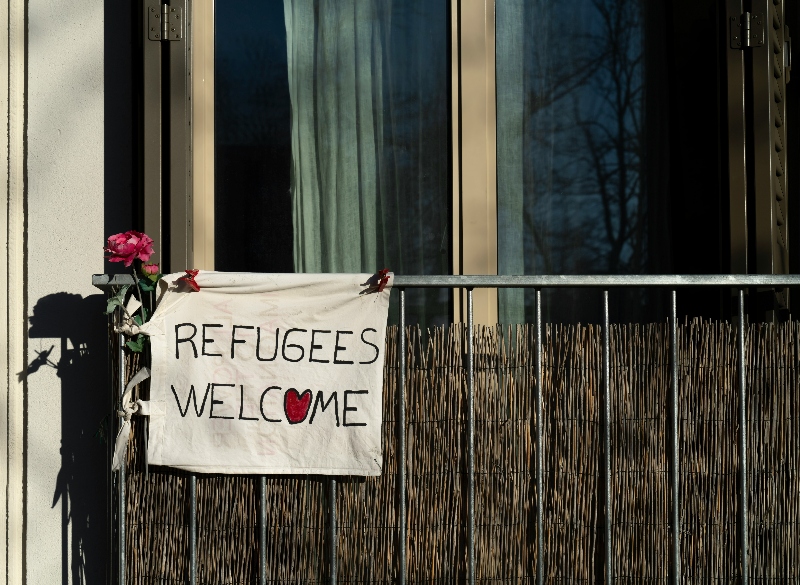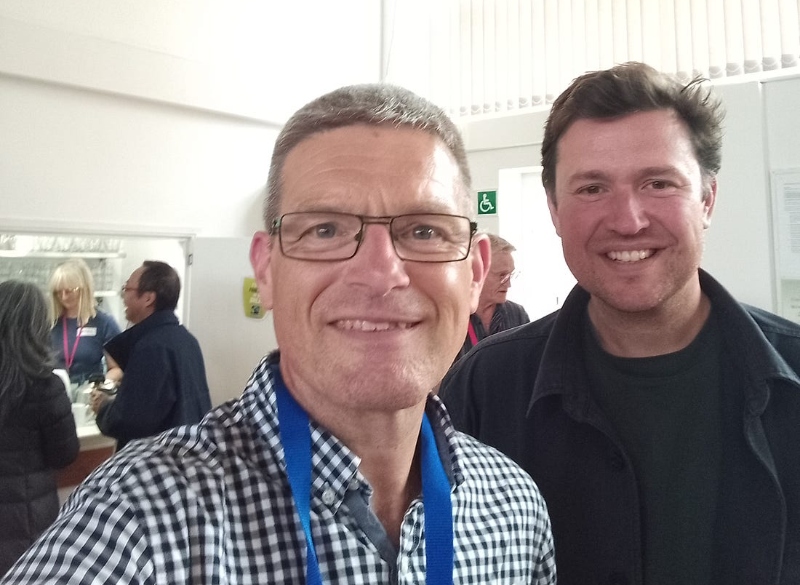An “Island of Strangers” or diverse communities of inclusion?
Once again, a Western government misleads its voters over immigration, writes John Heathershaw. Political discourse has become devoid of hope on this issue and misses the practical realities of inclusion

Without strong immigration rules, “we risk becoming an island of strangers, not a nation that walks forward together” opined UK prime minister Keir Starmer on 12 May. He painted a picture of low-skilled immigration taking potential jobs from British workers and businesses too lazy to train these workers. Big rises in immigration had caused “incalculable damage” he claimed.
Not 24 hours earlier one of Starmer’s newest Labour MPs was at International Café Exeter, held at my church (Pinhoe Road Baptist Church), enjoying the company of asylum seekers (including from our nearby refugee hotel which our International Café project visits every week) and new immigrants to the UK (many of them in lower-income jobs such as care work). Steve Race, the MP for Exeter, spoke of the government’s commitment to speed up asylum claims and ensure the integration of immigrants.
While Starmer was making his speech, I received an email from Race’s assistant asking for photos from his visit to put on his website. These are two contrasting stances towards immigration capture a divide across the West between nationalists and internationalists. While I side with those feeling dismay at Starmer’s rhetoric, we must recognise that both pictures portray a certain truth.

Image | Scott Bradridge of International Cafe Exeter at Pinhoe Road Baptist Church with Steve Race MP, 11 May 2025.
Starmer’s truths are inadvertent. The effect of immigration is largely incalculable as no one is counting the enormous social and economic benefit and weighing it against the putative damage. All nations are “islands of strangers” in the sense of being, as the great scholar of nationalism Benedict Anderson captured, “imagined communities”. How many of their fellow 70 million citizens do the average Briton know? No amount of what social scientists call “banal nationalism” – the “great British” TV shows, award ceremonies and flag raising – creates the bonds found in a small local community.
That these bonds are typically localized does not mean they are not international or between people from vastly different backgrounds. This is the intentional truth of the international café project in Exeter. Much of this comes from the fun and joy of events together or sampling each other’s food or trying each other’s traditions. But also, in giving clothes to a family that lost theirs in the channel. Seeing English language skills improve. And in helping new immigrants with sessions led by driving instructors, estate agents, and dentists.
There’s something similar in most cities and towns in the UK and other areas of the West with high immigration. They are typically led by churches working in partnership with local government and secular civil society, as we do in Exeter. In contrast to the angry images of Starmer, such projects offer a vision of hope.
One objection to this vision of hope is that it is not everyday life but a special project with lots of resources and energy behind it. Nationalists retort that, in large part, community forms based on commonality. This may sound like common sense but there is very little evidence to support it. The fact that Britain’s modern history has seen relatively low levels of immigration, and we imagine this past as being cohesive and national does not prove this point. Strong local communities can be built both on similarity and on diversity. They are built in the care offered by the African nurse to the Devonshire pensioner. Equally, parochialism and division are also common in monoethnic communities, as anyone who has lived in an English village will know.
Today, the UK and most Western countries face problems and have the tremendous privilege – as a rich country – of being able to attract talented and hardworking people from overseas to help address them. But there is no straightforward relationship where immigration is either the cause or the cure for these problems. They have occurred for different reasons and include things like an ageing population, changing values of young people (who value diversity, travel a lot, and aren’t necessarily attracted to jobs we have), and increased mental health problems and chronic illness (which demands lots of nurses and care workers). The recent surge in immigration is also due to the chaos of the post-Brexit system, the humanitarian visas for Hongkongers and Ukrainians, and increased numbers of international students. Almost all the issues have domestic not international causes.
This is where Starmer’s terrible speech is so hopeless and so divorced from reality. He talked about none of the long-term causes, ignored the context of globalization (which he foolishly declared over a couple of months ago), and offered no vision of hope other than the fallacy of a nation of people like you. Most opinion polling shows that UK voters favour reduced immigration and a liberal system which allows the health and care workers in. The median voter is utterly incoherent on an issue they don’t fully understand because politicians continually mislead them. This is true across most Western countries where people are crying out for actual leadership. That is why the fake leadership of the populists attracts voters desperate for some sense of direction.
Here, we see the limits of what projects like international café can do. National policy devoid of reality and hope creates limits to how much inclusion can be achieved locally. Struggling services, an unhealthy society, and underpaid workers do not create a recipe for inclusion. In this, Starmer’s apocalyptic rhetoric is a self-fulfilling policy: one of the best ways to undermine society is in misdiagnosing its problems.
Better policy would involve deciding whether government wants global universities or not (and if it wants to block international students it should be prepared to see them decline), extending humanitarian vias beyond Ukrainians and Hongkongers to a sustainable number of refugees from all countries (and thereby undermining the traffickers, most of whose customers are such people), facilitate community hosting of these asylum seekers (at a fraction of the cost of the hotels), and improving the pay and conditions of health and social care work to channel more UK-born people into the sector (thereby reducing the over-reliance on migrant workers).
I’m not holding my breath that these policies will be adopted. Our times are apocalyptic in that the state seems unable or incapable of providing order in this way. But even if the government stirs up division rather than promote inclusion, there are many church and civil society organizations that will continue to seek to make their local communities more inclusive.
Image | Ricardo Gomez Angel | Unsplash
John Heathershaw is Professor of International Relations at the University of Exeter, a member of Pinhoe Road Baptist Church in Exeter, and the author of Security After Christendom (Wipf & Stock, 2024)
This post originally appeared on his Substack Security After Christendom, and is republished with permission
Do you have a view? Share your thoughts via our letters' page.
Baptist Times, 13/05/2025